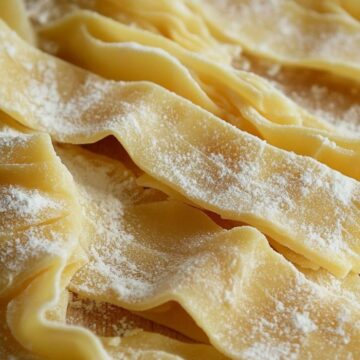
Homemade Egg Noodles
Ingredients
- 1 large egg
- 2 egg yolks
- 3 tablespoons cold water
- 1 teaspoon salt
- 2 cups all-purpose flour
Instructions
Mix Wet Ingredients:
- In a medium mixing bowl, whisk together the egg, egg yolks, and cold water until smooth and well combined.
Add Dry Ingredients:
- Stir in the salt and gradually add the flour, mixing with a fork or spoon until a rough dough begins to form.
Knead the Dough:
- Transfer the dough to a lightly floured surface. Knead it by hand for 8–10 minutes until the dough becomes smooth and elastic.
- If the dough is too sticky, add more flour 1 tablespoon at a time. If it’s too dry, add a few drops of water.
Rest the Dough:
- Wrap the dough in plastic wrap and let it rest at room temperature for 30 minutes. This helps relax the gluten, making it easier to roll out.
Roll Out the Dough:
- Divide the dough into 2 portions for easier handling.
- Roll each portion into a thin sheet (about ⅛ inch thick) using a rolling pin. For thinner noodles, keep rolling until desired thickness is achieved.
Cut the Noodles:
- Use a sharp knife or a pasta cutter to slice the dough into thin strips for noodles. Adjust the width based on preference—thin for soups, wider for fettuccine-style pasta.
Dry Slightly (Optional):
- For firmer pasta, let the noodles rest on a floured surface or drying rack for 15–20 minutes before cooking.
Cook the Noodles:
- Bring a large pot of salted water to a boil.
- Add the noodles and cook for 2–3 minutes or until tender but firm. Fresh noodles cook quickly, so keep an eye on them.
- Drain and serve immediately with your favorite sauce, soup, or butter.
Notes
- Flour Alternatives: Swap all-purpose flour with whole wheat flour for a nuttier flavor or semolina flour for a more traditional pasta texture.
- Egg Alternatives: Add an extra egg yolk instead of the whole egg for richer noodles, or reduce the yolks for a lighter dough.